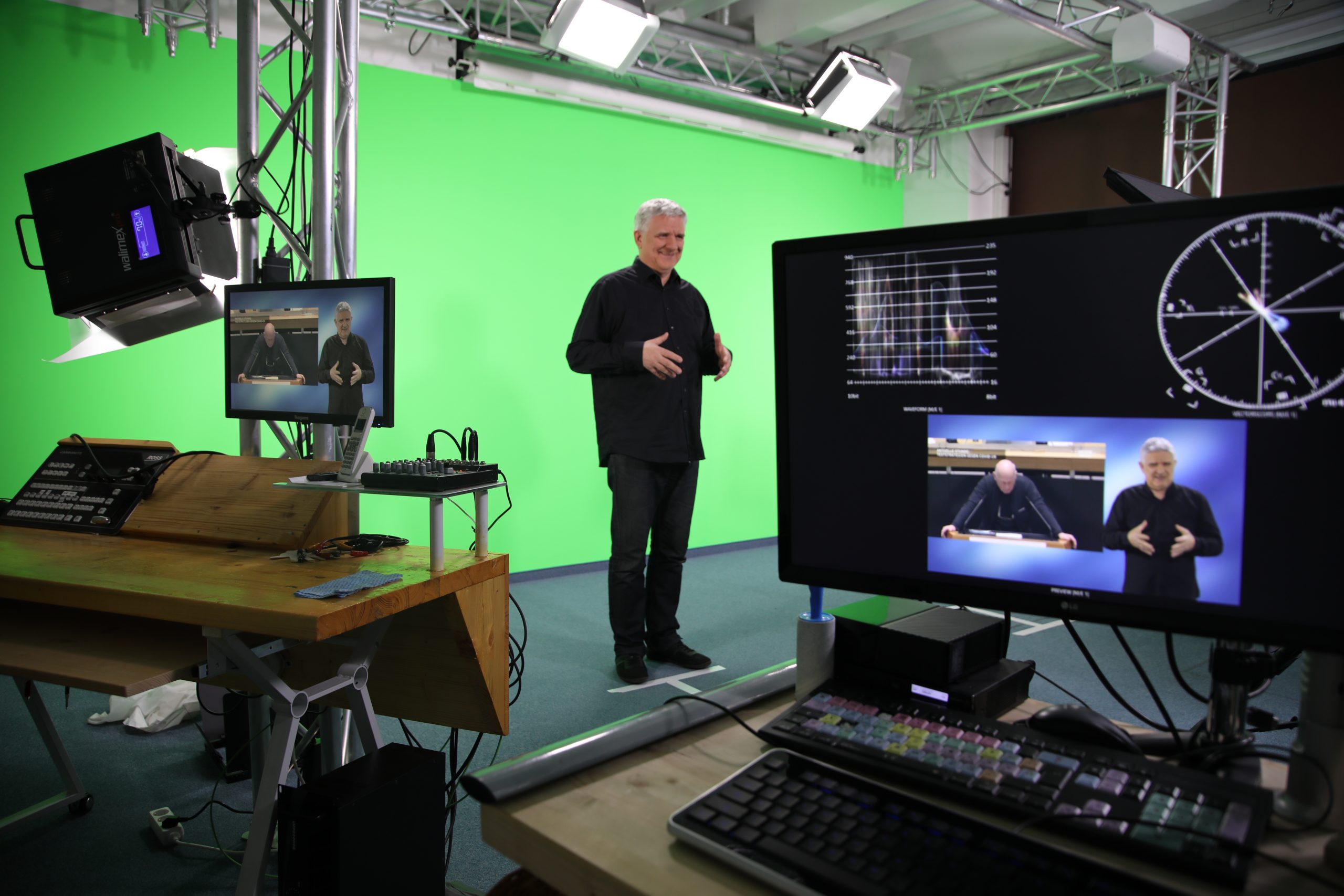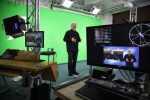Production of accessible media services for the deaf and more visibility to the work of deaf filmmakers
Media or digital media can facilitate inclusion. They play a key role in people being able to participate in society. So, what’s the situation with services for the deaf or hard of hearing? Simple, you might think: after all, subtitles are now available almost everywhere on demand - 90 per cent of the content in the public broadcasters’ mediatheques alone is subtitled.
But they are not a fully-fledged substitute. Children who can’t yet read are completely excluded. Moreover, written language is more difficult to grasp for deaf people whose first language is sign language. And hearing people also know how challenging it can be to follow a film and read the subtitles at the same time. What’s more, one doesn’t have the soundtrack that would usually be there to support the action.
Around 80,000 people in Germany use sign language, most of whom are deaf or hard of hearing. They need corresponding programme content or apps tailored to their needs. Since 2017, rbb has had sign language actors appearing in the bottom right hand corner of the screen for the daily broadcast of its Sandmännchen programme. And when sign language is used here or in an episode of the Tatort crime series, at a press conference of the German government or for heute journal, this service has often been coming from one of Germany’s largest providers of simultaneous interpreting for the deaf: the Zentrum für Kultur und visuelle Kommunikation der Gehörlosen Berlin/Brandenburg e.V., or ZFK e.V. for short.
Tatort and Sandmännchen in sign language
The ZFK e.V. has its studios located right on the media city campus. Uwe Schönfeld, board member and a sign language interpreter himself, takes us on a tour of the premises. The walls are adorned with old film portraits and there is a welcoming atmosphere. An episode of Tatort is currently being recorded in a studio. The interpreter has dressed for the part and is standing in front of a green screen. Her colleague behind the cameras is following the scene on several screens, with the dialogue list right in front of him. Another room is available for 3D recordings and one more is now where AI is being deployed to prepare the scripts and screenplays, for example, by translating the dialogue for the interpreters into German Sign Language (DGS).
Those who have grown up with DGS as their mother tongue are used to different sentence and grammatical structures. Unlike written German, for example, the larger object always comes before the smaller object: for example, “eye in the hair” instead of “hair in the eye”. Schönfeld recalls the high number of clicks for Sandmännchen and the fan mail from a boy who was only 3 ½ years old. The ZFK has children and young people brought in specially to do the sign language interpretation for the younger ones in the audience. A fairy tale, for example, would see them sometimes playing the king and the narrator at the same time and wearing the respective costumes to make it easier to understand the dialogue and distinguish between the different characters. Care is also taken in adapting the interpreters’ clothing to the respective role in films like the Tatorts.
In-house media production and apps
Schönfeld quotes the motto “Nothing about us without us” from the UN Convention on the Rights of Persons with Disabilities. “Deaf people know the needs of deaf people best of all and are therefore best able to implement them themselves in an area, for example, like the film industry. There are few things that are so interconnected - culture, language, image. We have deaf lecturers in our education department who can also apply their expertise here. That is the basis of all our work to bring the different areas together. The media sector is one we would particularly like to expand in this respect,” Schönfeld says.
The majority of the 50-plus employees at the ZFK are non-hearing. The Centre also has its own media production department alongside consulting services, interpreting service as well as sign language awareness courses. Its team consists of professionally trained deaf and hearing cameramen/women, editors, actors, journalists and project managers who can provide everything from a single source - from the overall concept and textual modifications through to editing and camerawork. ZFK also provides deaf supervisors for the film industry to mediate between all of the departments during a shoot and give advice to the directors.
It makes a vast difference whether someone is playing a deaf person or is actually deaf and can communicate in sign language. There are other areas where the media or digital media are also more integrated into the world of deaf people. Video telephony has greatly simplified communication and makes apps accessible. The ZFK has developed two of them itself. The WIS app offers a video interpreting service at the touch of a button and the emergency call app WIS-Emergency helps to send important information to rescue services by using an emergency call button. The service, which can be used to connect with sign language interpreters in a live link-up, is currently in the test phase.
Uwe Schönfeld takes a dim view at the moment of avatars as digitally animated figures. “It may work for them to provide standard information, say, at airports. However, they lack what makes human interpreters special when you start talking about events or even the translation of a website: it’s not just about the hand gestures, you also need the face to show emotions, facial expressions and posture. It’s a complex interplay which is something avatars can’t deliver,” Schönfeld explains. The costs for interpreters are generally high. Not every sign language interpreter has a high level of competence in German written language, some only translate literally. Additional support is then needed to obtain good dialogue lists based on the screenplay. And many things that might be feasible thanks to the technical resources at the TV stations founder due to the associated high costs.
The Della Awards and the 1st International Film Festival for Deaf Filmmakers
The ZFK launched the 1st International Film Festival for Deaf Filmmakers and the Della Awards to give more visibility to the work of deaf filmmakers. They took place in autumn 2023 at Studio Babelsberg together with an award ceremony. The Filipino production “Tell Her Flag” was named Best Feature Film out of over 2,500 submissions which had included commercial films, indie productions and documentaries. Actress Anne Zander (who herself works at ZFK) was recognised for her role in the ZDF drama “You Shall Hear”. Actors Troy Kotsur (Oscar winner for Coda) and John Marceau were among the guests coming from Hollywood, and actress Emmanuelle Laborit made the trip to Babelsberg from France. “They are all well-known personalities, yet each in their own way is a lone wolf in their sector,” Uwe Schönfeld says. The Della Awards not only play an important role in promoting the visibility and recognition of deaf people in the film business, but also contribute to greater networking within the industry.
The ZFK itself also provides funding to support deaf film-makers. Uwe Schönfeld mentions the plan to offer more in the digital realm - away from analogue television - and to launch a dedicated channel or streaming platform for the deaf. This would gather film material from all over the world that is not only intended for the narrow target group of deaf people, but also for their multipliers, parents, grandparents, friends or students of sign language. The awards are to be held at the studios every two years, with the next Della Awards being presented in autumn 2025.
About MTH Blog
The media technologies of the future are already being used today – not only in the entertainment sector, but also in a wide variety of industries. Christine Lentz meets up with tech enthusiasts, established companies and researchers for our monthly MediaTech Hub Potsdam blog to tell the stories behind the innovative business models.



